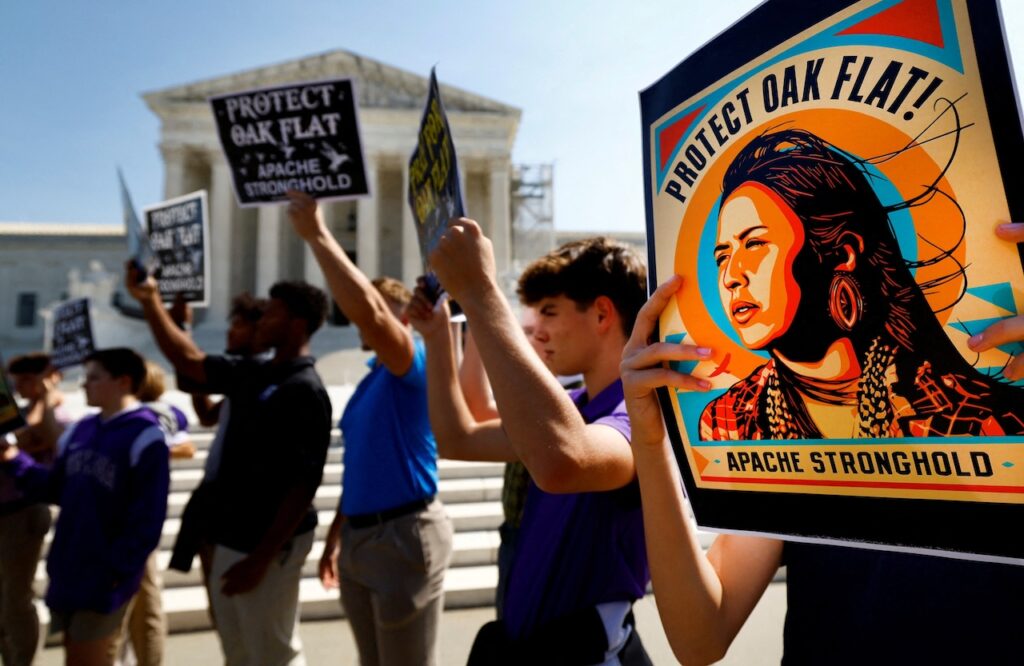WASHINGTON (OSV News) – Catholic bishops, groups and legal scholars have joined other religious groups in offering their support to an Indigenous coalition asking the Supreme Court to protect an Apache sacred site from destruction by a copper mining giant. They argue the case has serious implications for the scope of the Religious Freedom Restoration Act.
In September, a coalition of Western Apache people, along with other Native American and non-Indigenous supporters, under the banner of the non-profit Apache Stronghold, asked the high court to protect their sacred site at Oak Flat, Arizona, after a federal appeals court rejected their request.
Oak Flat in Tonto National Forest – about 70 miles outside of Phoenix – is considered a sacred site by the region’s Indigenous peoples and is on the National Register of Historic Places. However, after the discovery of copper deposits on the land, in December 2014, Congress authorized the U.S. Forest Service to swap the land for other sites with Resolution Copper, a foreign-owned mining company, and lifted a mining ban on Oak Flat, known by the Apache as Chi’chil Bildagoteel.
Mining the site would result in a crater nearly 2 miles in diameter and about 800 to 1,000 feet deep, according to an estimate in an environmental impact report mandated by the National Environmental Protection Act. The Apache Stronghold coalition says the mining project would destroy the Apache sacred site, which they likened to Mount Sinai.
A diverse group of religious organizations weighed in to ask the high court to take up the case, including Catholic ones: The U.S. Conference of Catholic Bishops, the Knights of Columbus, and Notre Dame Law School’s Lindsay and Matt Moroun Religious Liberty Clinic, all filed friend of the court briefs, also known as amicus briefs, in support.
“This strong showing of support from a diversity of faiths – Catholics, Protestants, Muslims, Jews, Sikhs, and more – demonstrates that the threat to religious freedom at Oak Flat is a threat to religious freedom everywhere,” Wendsler Nosie Sr. of Apache Stronghold said in a statement. “We pray that the justices take our case and ensure that our religious practices receive the same respect that all other faith traditions enjoy.”
In a statement noting the broad group of supporters in the case, Native American Rights Fund Executive Director John Echohawk said, “Eradicating sacred places where religious practices take place should be a violation of the Religious Freedom Restoration Act for any religious group.”
“For many Native religions, eliminating a sacred place may end religious exercise completely,” Echohawk said.
In a September statement responding to Apache Stronghold’s certiorari petition to the high court, a Resolution Copper spokesperson argued the case “does not present any question worthy of Supreme Court review” and that the appeals court correctly applied “well-established Supreme Court precedent.”
“This case is about the government’s right to pursue national interests with its own land — an unremarkable and longstanding proposition that the Supreme Court and other courts have consistently reaffirmed,” the spokesperson said, arguing the mining project “is vital to helping secure America’s energy future with a domestic supply of copper and other critical minerals.”
The Supreme Court has not yet indicated whether it will take up the case, but Luke Goodrich, vice president and senior counsel at Becket, a religious liberty law firm representing Apache Stronghold, said in a statement, “Obliterating Native sacred land to make way for a copper mine is a tragic betrayal of our nation’s promise of religious freedom for all.”
“We expect the Supreme Court to take this case and confirm that Native American religious practices are fully protected by federal law,” he said.

